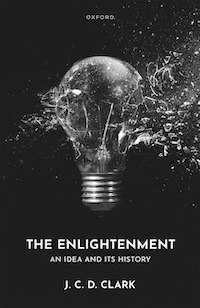LAWRENCE — The Enlightenment was a European intellectual and philosophical movement that occurred in the 17th and the 18th centuries. Or was it?
“People believe it was a thing, a phenomenon, a movement. And it has been turned into a movement by a process which is technically called ‘reification.’ We take a word, and we turn it into a thing,” said J.C.D. Clark, distinguished professor emeritus of British history at the University of Kansas.
His new book, titled “The Enlightenment: An Idea and Its History,” provides a critical historical analysis of the Enlightenment in England, Scotland, France, Germany and the United States from 1650 to the present. It argues that the degree of commonality between social and intellectual movements in each has been overstated for polemical purposes, and he calls for a fundamental reconsideration of the term.
The book is published by Oxford University Press.
“My argument is that the Enlightenment is a concept, which was one of many concepts devised within academia in the last 150 years or so,” Clark said.
“These were designed to organize knowledge and make it manageable. But every concept, like every ideology, follows a trajectory. Every ideology is conceptualized at one particular point in time. It’s then developed. It’s popularized. It expands. It enjoys hegemony, and then it loses that hegemony,” he said.
As a historian, Clark said he considers himself a “deconceptualizer.”
“I take great ideologies, and I say the point is not to agree with them or to disagree with them, not to say whether they were good or bad things. The point historically is to explain when, how and why things happened as they did,” he said.

The impetus for this somewhat radical viewpoint came when Clark attended the 15th International Congress on the Enlightenment, held in 2019 and hosted by the University of Edinburgh.
He said, “No less than 1,700 delegates attended from all over the world. There was a huge meeting hall in which they could all be present for plenary sessions. And although the acoustics were not very good, that didn’t matter because obviously what they were hearing was exactly what they wanted to hear. They nodded and smiled. After the second day of the conference, I came away with a distinct feeling that I was facing odds of 1,699 to 1.”
But during the third day, Clark realized that despite what he called a “remarkable collection of intellectuals,” they were merely echoing one another. He compared it to what writer George Orwell dubbed “groupthink” or what sociologist Robert Bellah called a “civil religion.”
“So the odds were not 1,699 to 1,” Clark said. “The odds were actually 1 to 1.”
While some of the key figures associated with the Enlightenment were European notables such as Voltaire, Rousseau and Kant, it can be argued that Americans such as Thomas Jefferson were part of this collective. In fact, Clark delivers a chapter titled “Was the Enlightenment Invented in America?”
“The Enlightenment was a notion which caught on in America in the 20th century, just as it caught on in Britain in the 20th century, and rather belatedly, in France, Italy, Spain and elsewhere. But my question was, what did it mean? What were these people arguing about? Why were they so heavily committed to and invested in their notion of what Enlightenment was? It varies a bit with each country,” Clark said.
A native of Surrey, Clark served as a professor at KU from 1995 until his retirement in 2018. His other books include “The Language of Liberty 1660-1832: Political Discourse and Social Dynamics in the Anglo-American World” (Cambridge University Press, 1994), “Samuel Johnson: Literature, Religion and English Cultural Politics from the Restoration to Romanticism” (Cambridge University Press, 1994) and “Thomas Paine: Britain, America, and France in the Age of Enlightenment and Revolution” (Oxford University Press, 2018).
“In previous books, I and other scholars working on similar concepts like feudalism or the Reformation or the Industrial Revolution came to doubt individual ones of these concepts. We didn’t tie it all together. I began writing this Enlightenment book when I considered what would happen if we tied all these debates together,” he said.
Has writing this book added to his own personal enlightenment?
“Only in the sense of self-satire,” Clark said.
“In the preface, I describe myself as enlightened. I hope my critics will be indulgent toward the book’s enlightened failings and be sympathetic toward its enlightened intentions.”
This post was originally published on here






